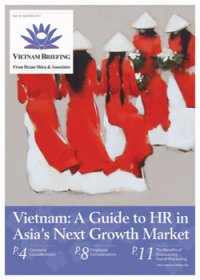Vietnam to Raise Special Consumption Tax on Cigarettes, Beer, and Spirits
HCMC – Vietnam’s National Assembly Standing Committee (NASC) has announced that the special consumption tax (SCT) on cigarettes, beer, and spirits (a “sin tax”) will be raised on January 1, 2016. SCT is a form of excise tax that applies to the production or importation of specific goods and to certain services.
 RELATED: Dezan Shira & Associates’ International Tax Planning Services
RELATED: Dezan Shira & Associates’ International Tax Planning Services
The tax raises will be implemented using the following schedule:
- Tobacco products (current tax rate of 65 percent):
- 70 percent tax from January 1, 2016
- 75 percent tax from January 1, 2018
- Beer (current tax rate of 50 percent):
- 55 percent from January 1, 2016
- 60 percent from January 1, 2017
- 65 percent from January 1, 2018
- Wine under 20 percent proof (current tax rate of 25 percent):
- 35 percent from January 1, 2016 (not finalized yet)
- Wine over 20 percent proof and spirits (current tax rate of 50 percent):
- 65 percent from January 1, 2016 (not finalized yet)
The tax on tobacco products, particularly on cigarettes, is aimed at reducing the level of smoking in the country. Vietnam has a high number of smokers, over 15 million, and is struggling to deal with the associated health problems that come along with smoking. According to Vietnam’s Ministry of Health, tobacco-related illnesses kill 40,000 people each year in the country, a number which is expected to rise to 70,000 per year by 2030. Of course, the tax will also have the added benefit of increasing the state’s coffers – the new tax is expected to contribute more than VND 2.9 trillion (US$136.5 million) in taxes in 2015 and VND 7.7 trillion (US$362.4 million) in 2018.
The taxes on alcohol are also in response to what the government sees as the increasing harm caused by excessive drinking throughout the country – Vietnam consumes the third largest amount of beer in Asia, behind only China and Japan. An additional reason for the tax is to help boost state budget income.
However, a potential problem caused by the increase in taxes is the associated rise in the smuggling of counterfeit products into the country; the government is currently mulling potential countermeasures to this issue.
SCT snapshot
SCT is levied on the production and importation of 11 categories of products and six types of services which are considered to be luxurious or non-essential. Generally, goods and services subject to SCT are also subject to VAT. The basis of VAT calculation is the selling price plus the SCT. For imported products, VAT is imposed on the dutiable value plus import duties plus SCT.
Asia Briefing Ltd. is a subsidiary of Dezan Shira & Associates. Dezan Shira is a specialist foreign direct investment practice, providing corporate establishment, business advisory, tax advisory and compliance, accounting, payroll, due diligence and financial review services to multinationals investing in China, Hong Kong, India, Vietnam, Singapore and the rest of ASEAN. For further information, please email vietnam@dezshira.com or visit www.dezshira.com.
Stay up to date with the latest business and investment trends in Asia by subscribing to our complimentary update service featuring news, commentary and regulatory insight.
Related Reading
 Vietnam: A Guide to HR in Asia’s Next Growth Market
Vietnam: A Guide to HR in Asia’s Next Growth Market
In this issue of Vietnam Briefing, we attempt to clarify human resources (HR) and payroll processes in Vietnam. We first take you through the current trends affecting the HR landscape and then we delve into the process of hiring and paying your employees. We next look at what specific obligations an employer has to their employees. Additionally, we guide you through the often complex system of visas, work permits, and temporary residence cards. Finally, we highlight the benefits of outsourcing your payroll to a “pan-Asia” vendor.
 Tax, Accounting, and Audit in Vietnam 2014-2015
Tax, Accounting, and Audit in Vietnam 2014-2015
The first edition of Tax, Accounting, and Audit in Vietnam, published in 2014, offers a comprehensive overview of the major taxes foreign investors are likely to encounter when establishing or operating a business in Vietnam, as well as other tax-relevant obligations. This concise, detailed, yet pragmatic guide is ideal for CFOs, compliance officers and heads of accounting who need to be able to navigate the complex tax and accounting landscape in Vietnam in order to effectively manage and strategically plan their Vietnam operations.
 An Introduction to Doing Business in Vietnam 2014 (Second Edition)
An Introduction to Doing Business in Vietnam 2014 (Second Edition)
An Introduction to Doing Business in Vietnam 2014 (Second Edition) provides readers with an overview of the fundamentals of investing and conducting business in Vietnam. Compiled by Dezan Shira & Associates, a specialist foreign direct investment practice, this guide explains the basics of company establishment, annual compliance, taxation, human resources, payroll, and social insurance in the country.
- Previous Article Vietnam Expands Scope of Foreign Contractor Tax
- Next Article Vietnam Amends CIT and VAT Through Decree 91









